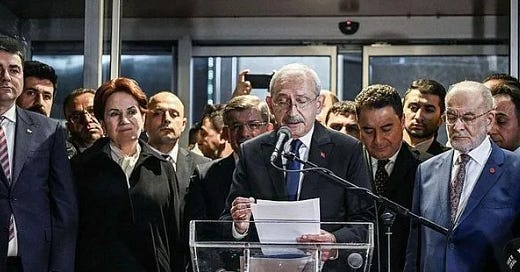Hi folks,
I hope that those of you who celebrate the holidays this week are having a good time.
I’d like to respond to a question that has come up with the previous two posts. After Political Analysis #2, in which I reflected on the growing rift between IYI Party and the CHP,
asked:For the uninitiated in Turkish politics, can you explain the difference between a typical CHP voter and IYI voter. From across an ocean it just seems like both are on the secular side of the divide so whatever differences they have are probably minor.
I wrote a short comment in response, but after my predictions about politics in 2024,
again wrote:Sorry - I always pop up with an IYI party question since I still don't fully understand how they are different than CHP - other than they hate Kurds more.
The part that I struggle with is how can IYI party get closer to AKP/Islamists given fundamental difference in vision about islam's place in Turkish society. Also how would that work with AKP's existing alliance with MHP?
Thanks.
Clearly, my little response failed to assuage
’s concerns, so below is a post-length response. Let it not be said that Kültürkampf turns away the demanding reader!I will also use the question to touch on some of the broader themes in Turkish politics, as well as my problems with some of the more classic approaches to the subject. I hope that’ll clarify things.
Let’s start with a basic observation: the CHP-IYI rift is real, and it’s widening. There are now too many data points to dismiss it. The rift was evident in March, when Akşener almost broke up the opposition alliance ahead of the elections, and it is evident as there’s less than a 100 days to go before the regional elections, and she still refuses to work with the CHP on the big cities, including Istanbul and Ankara. The rift was also evident when, over the last weekend, 12 Turkish soldiers were reported killed in clashes with the PKK, the Erdoğan-controlled majority in parliament put out a statement “condemning terror,” and the CHP and DEM (the new HDP) refused to sign it, but IYI did.
I suspect that sort of thing, especially on security and foreign policy, is going to be more frequent. Over time, it will improve rapport between IYI and the presidential palace.
The IYI-CHP split is apparent across CHP-dominated media like Halk TV and Sözcü TV as well. A bit like that fateful weekend in early March, they’ve been directing their fire at Akşener and her inner circle, questioning their decisions, casting doubt on their integrity, and ever so slightly accusing them of betraying the collective opposition effort against Erdoğan.
So to get at
’s question, how can this be? Weren’t the CHP and IYI different flavors of “secular,” Kemalist, Turkish life? How could one of them possibly switch over to the other side, where people had a fundamentally different conception of Islam in society?Let’s look at a couple off assumptions in the questions.
Keep reading with a 7-day free trial
Subscribe to Kültürkampf to keep reading this post and get 7 days of free access to the full post archives.




